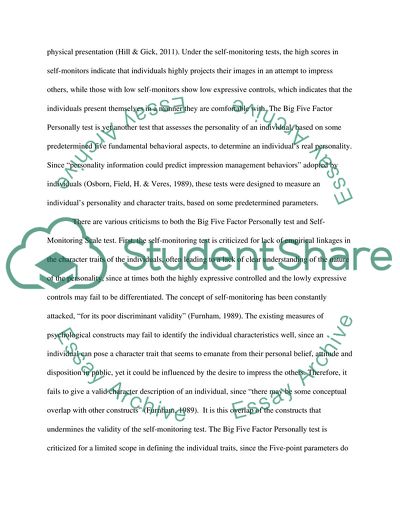Cite this document
(“Big Five Factor Personally Test and Self-Monitoring Scale Test Essay”, n.d.)
Big Five Factor Personally Test and Self-Monitoring Scale Test Essay. Retrieved from https://studentshare.org/psychology/1619388-essay-about-the-two-personality-test-that-i-have-chosen-answer-all-four-questions-below-about-them-and-use-the-results-and-compare-them-i-have-chosen-big-five-factor-personally-test-and-self-monitoring-scale-test-look-at-attachment-called-assignment-2
Big Five Factor Personally Test and Self-Monitoring Scale Test Essay. Retrieved from https://studentshare.org/psychology/1619388-essay-about-the-two-personality-test-that-i-have-chosen-answer-all-four-questions-below-about-them-and-use-the-results-and-compare-them-i-have-chosen-big-five-factor-personally-test-and-self-monitoring-scale-test-look-at-attachment-called-assignment-2
(Big Five Factor Personally Test and Self-Monitoring Scale Test Essay)
Big Five Factor Personally Test and Self-Monitoring Scale Test Essay. https://studentshare.org/psychology/1619388-essay-about-the-two-personality-test-that-i-have-chosen-answer-all-four-questions-below-about-them-and-use-the-results-and-compare-them-i-have-chosen-big-five-factor-personally-test-and-self-monitoring-scale-test-look-at-attachment-called-assignment-2.
Big Five Factor Personally Test and Self-Monitoring Scale Test Essay. https://studentshare.org/psychology/1619388-essay-about-the-two-personality-test-that-i-have-chosen-answer-all-four-questions-below-about-them-and-use-the-results-and-compare-them-i-have-chosen-big-five-factor-personally-test-and-self-monitoring-scale-test-look-at-attachment-called-assignment-2.
“Big Five Factor Personally Test and Self-Monitoring Scale Test Essay”, n.d. https://studentshare.org/psychology/1619388-essay-about-the-two-personality-test-that-i-have-chosen-answer-all-four-questions-below-about-them-and-use-the-results-and-compare-them-i-have-chosen-big-five-factor-personally-test-and-self-monitoring-scale-test-look-at-attachment-called-assignment-2.


